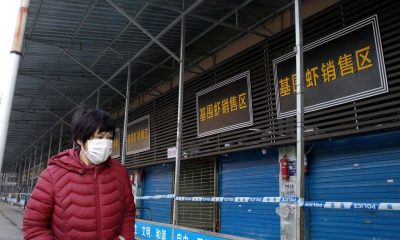Business
How a hair-care company went from salon supplier to sanitizer powerhouse
When AG Hair moved into its new, 70,000-sq.-foot, state-of-the-art manufacturing facility in Coquitlam, B.C., two years ago, it was part of a plan to supercharge expansion of its hair care product line to salons in international markets. Europe was next on its list. Then COVID-19 hit.
Not only was the European expansion put on hold, but salons in major markets across Canada and the United States were temporarily closed. Very few were purchasing hair products, so manufacturing was halted in mid-March, leaving most of the company’s 82 employees out of work.
AG Hair could have waited out the pandemic but instead decided to lean into its entrepreneurial culture and make a sharp pivot. It began providing hand-sanitizing products for front-line health-care workers, addressing a global shortage.
“We realized there was this massive need for health-care professionals, and we wanted to make a difference and be able to provide them with the products they needed,” says AG Hair CEO Graham Fraser.
AG Hair received Canadian and U.S. approvals a week after applying for the licences needed to make sanitizer, and produced samples to show local authorities within 48 hours.
AG Hair’s Coquitlam facility has pivoted to making hand sanitizer (Photograph by Alana Paterson)
“That rapid response time, and the fact that we had gone through all of the Health Canada regulatory hurdles, showed [the local health authorities] that we were a partner they could trust and someone they could look to, to deliver the products they needed,” Fraser says.
Within a month, the company started pumping out the products, first for the health-care industry, then for consumers on its own website and on Amazon. About 10 per cent of AG Hair’s hand-sanitizer production also went to people in need, as identified by organizations such as United Way.
Parallel 49 Brewing Company is also using AG Hair’s Coquitlam manufacturing facility to produce its own blend of liquid hand sanitizer for front-line health and emergency workers, in partnership with the B.C. government.
Fraser credits his team for its energy and creativity in making the hand-sanitizer production happen, and helping put AG Hair staff back to work.
“We realized we had an opportunity . . . and then it became this incredible, almost war-room mentality and collaboration with our owners, our executive team and our people to say, ‘How are we going to get through this?’ ” Fraser recalls. “I think our success speaks to the type of people we have and the entrepreneurial spirit of pursuing every avenue we have, understanding how we can produce the products and making it happen.”
AG Hair’s commitment to investing in future growth is a big part of what makes it a Best Managed company, says Nicole Coleman, a partner at Deloitte and co-lead of its Best Managed Program in B.C.
“Capability and innovation come through quite strongly with this company,” says Coleman, who is also AG Hair’s coach at Deloitte. “I don’t think they would be able to pivot as quickly if they weren’t so strategic and had the internal capabilities to do it.”
The manufacturing facility was a big investment, but one Coleman says has already paid dividends.
“They were looking forward with a strategic plan in mind about future growth and how they could expand, rather than just focusing on the day to day,” she says. “Best Managed companies are always pushing the envelope and are conscious about planning for the future.”
AG Hair was founded in Vancouver in 1989 by hairstylist John Davis and graphic artist Lotte Davis. The husband-and-wife team began bottling hair products in their basement and selling them direct to salons from the back of a station wagon.
The company eventually moved its manufacturing off-site, to a third party. One day, John went to watch the operations and was surprised to see salt being poured into the mixture. Although he was told salt is commonly used as a thickener, he didn’t like the potential side effects of dry hair and skin.
It was at that moment John decided the company would oversee its own manufacturing. “Through that experience, John also became an expert in product development,” says Fraser, who came to the company in 2000 as director of sales.
After having worked for more than two decades at PepsiCo and Kraft Foods, Fraser was eager to work at a smaller, more agile company where he felt he could help make a difference.
“It was perfect because I got to bring a lot of structure and process that I learned in those organizations, but I also learned an awful lot about being an entrepreneur from John and Lotte: that sense of urgency, the decision-making process, the need to get things done and drive things forward and pursue opportunities,” he says.
Fraser has helped drive AG Hair’s expansion into the U.S. and internationally, including Australia, Taiwan, and Central and South America. A portion of its sales go to One Girl Can, a charity founded by Lotte that provides schooling, education and mentoring for girls in sub-Saharan Africa.
Fraser also oversees the development of new, trending products, including a new deep-conditioning hair mask made with 98 per cent plant-based and natural ingredients. Hand-sanitizing spray and gel will be the latest addition to the company’s product lineup.
“We don’t see the demand [for hand-sanitizing products] going away,” he says. “As the isolation policies start to get lifted, people are going to need forms of security and protocols as they get back into regular life and work. We see there’s going to be a need for these types of products long-term.”
This article appears in print in the June 2020 issue of Maclean’s magazine with the headline, “Working out the kinks.” Subscribe to the monthly print magazine here.
The post How a hair-care company went from salon supplier to sanitizer powerhouse appeared first on Canadian Business - Your Source For Business News.
Business
Most Americans now fear touching cash, survey says
Dirty Money is a popular Netflix documentary. But the term could also be used to describe how many Americans feel about handling cash these days.
According to a new survey, 54% of Americans are concerned about touching coins or bills due to COVID, while 60% plan to use so-called touchless payments in the future.
The findings are based on an online survey of 600 people conducted by Rapyd, a global payments company backed by digital payment giant Stripe. The survey also found that 45% of Americans want to see pennies phased out, while 5% want all coins to be eliminated.
In an interview with Fortune, Rapyd CEO Arik Shtilman said COVID has rapidly accelerated an existing trend of Americans ditching cash for other forms of payment.
Shtilman added, though, that it will take years before the U.S. resembles Asia, where phone-based digital wallets are ubiquitous. He said this is partly due to the large number of Americans who like to pay with cash, as well as the slow process of replacing existing point-of-sale systems—which rely on consumers using physical cards and signing receipts—with machines that can read digital wallets like Apple Pay.
The move away from cash could also be accelerated by governments around the world using COVID as a pretext to reduce the amount of coins and bills in circulation, Shtilman says.
In the United States, the pandemic has already produced a coin shortage in part due to decreased activity at laundromats, transit facilities and other places where Americans spend coins.
Meanwhile, the U.S. mint scaled back its coin operations in the spring over health concerns, but returned to full production in June. According to a recent Fortune report, the mint plans to produce 17.8 coins by the end of the year—7.4 billion more than last year—suggesting the federal government does not intend to use the pandemic to accelerate a move away from cash. The U.S. Mint did not immediately respond to a request for comment about its latest plans.
And while many younger Americans rarely touch cash, a fully cashless society is still far off, at least in part by design. As Fortune reported in June, several U.S. cities have introduced law requiring merchants to accept cash—in part because millions of Americans lack access to payment cards and other tools of the banking system.
More must-read finance coverage from Fortune:
- Looking for a job in finance? These Fortune 500 banks have the most job openings
- Congress still “a long ways away” from deal on bill that would include more stimulus checks
- Ford’s Jim Hackett had a bold vision—but couldn’t improve this all-important financial metric
- SEC reportedly investigating Kodak’s government loan and stock spike following Trump deal
- A running list of companies that have filed for bankruptcy during the coronavirus pandemic
Business
How a hair-care company went from salon supplier to sanitizer powerhouse
When AG Hair moved into its new, 70,000-sq.-foot, state-of-the-art manufacturing facility in Coquitlam, B.C., two years ago, it was part of a plan to supercharge expansion of its hair care product line to salons in international markets. Europe was next on its list. Then COVID-19 hit.
Not only was the European expansion put on hold, but salons in major markets across Canada and the United States were temporarily closed. Very few were purchasing hair products, so manufacturing was halted in mid-March, leaving most of the company’s 82 employees out of work.
AG Hair could have waited out the pandemic but instead decided to lean into its entrepreneurial culture and make a sharp pivot. It began providing hand-sanitizing products for front-line health-care workers, addressing a global shortage.
“We realized there was this massive need for health-care professionals, and we wanted to make a difference and be able to provide them with the products they needed,” says AG Hair CEO Graham Fraser.
AG Hair received Canadian and U.S. approvals a week after applying for the licences needed to make sanitizer, and produced samples to show local authorities within 48 hours.
AG Hair’s Coquitlam facility has pivoted to making hand sanitizer (Photograph by Alana Paterson)
“That rapid response time, and the fact that we had gone through all of the Health Canada regulatory hurdles, showed [the local health authorities] that we were a partner they could trust and someone they could look to, to deliver the products they needed,” Fraser says.
Within a month, the company started pumping out the products, first for the health-care industry, then for consumers on its own website and on Amazon. About 10 per cent of AG Hair’s hand-sanitizer production also went to people in need, as identified by organizations such as United Way.
Parallel 49 Brewing Company is also using AG Hair’s Coquitlam manufacturing facility to produce its own blend of liquid hand sanitizer for front-line health and emergency workers, in partnership with the B.C. government.
Fraser credits his team for its energy and creativity in making the hand-sanitizer production happen, and helping put AG Hair staff back to work.
“We realized we had an opportunity . . . and then it became this incredible, almost war-room mentality and collaboration with our owners, our executive team and our people to say, ‘How are we going to get through this?’ ” Fraser recalls. “I think our success speaks to the type of people we have and the entrepreneurial spirit of pursuing every avenue we have, understanding how we can produce the products and making it happen.”
AG Hair’s commitment to investing in future growth is a big part of what makes it a Best Managed company, says Nicole Coleman, a partner at Deloitte and co-lead of its Best Managed Program in B.C.
“Capability and innovation come through quite strongly with this company,” says Coleman, who is also AG Hair’s coach at Deloitte. “I don’t think they would be able to pivot as quickly if they weren’t so strategic and had the internal capabilities to do it.”
The manufacturing facility was a big investment, but one Coleman says has already paid dividends.
“They were looking forward with a strategic plan in mind about future growth and how they could expand, rather than just focusing on the day to day,” she says. “Best Managed companies are always pushing the envelope and are conscious about planning for the future.”
AG Hair was founded in Vancouver in 1989 by hairstylist John Davis and graphic artist Lotte Davis. The husband-and-wife team began bottling hair products in their basement and selling them direct to salons from the back of a station wagon.
The company eventually moved its manufacturing off-site, to a third party. One day, John went to watch the operations and was surprised to see salt being poured into the mixture. Although he was told salt is commonly used as a thickener, he didn’t like the potential side effects of dry hair and skin.
It was at that moment John decided the company would oversee its own manufacturing. “Through that experience, John also became an expert in product development,” says Fraser, who came to the company in 2000 as director of sales.
After having worked for more than two decades at PepsiCo and Kraft Foods, Fraser was eager to work at a smaller, more agile company where he felt he could help make a difference.
“It was perfect because I got to bring a lot of structure and process that I learned in those organizations, but I also learned an awful lot about being an entrepreneur from John and Lotte: that sense of urgency, the decision-making process, the need to get things done and drive things forward and pursue opportunities,” he says.
Fraser has helped drive AG Hair’s expansion into the U.S. and internationally, including Australia, Taiwan, and Central and South America. A portion of its sales go to One Girl Can, a charity founded by Lotte that provides schooling, education and mentoring for girls in sub-Saharan Africa.
Fraser also oversees the development of new, trending products, including a new deep-conditioning hair mask made with 98 per cent plant-based and natural ingredients. Hand-sanitizing spray and gel will be the latest addition to the company’s product lineup.
“We don’t see the demand [for hand-sanitizing products] going away,” he says. “As the isolation policies start to get lifted, people are going to need forms of security and protocols as they get back into regular life and work. We see there’s going to be a need for these types of products long-term.”
This article appears in print in the June 2020 issue of Maclean’s magazine with the headline, “Working out the kinks.” Subscribe to the monthly print magazine here.
The post How a hair-care company went from salon supplier to sanitizer powerhouse appeared first on Canadian Business - Your Source For Business News.
Business
Inovio To Start Phase 2/3 Study Of Covid-19 Candidate In Sept.; Shares Drop 8%
Inovio Pharmaceuticals Inc. plans to initiate Phase 2/3 study trials of INO-4800, its experimental vaccine candidate against the novel coronavirus, in September and produce at least 1 million doses this year.The company said that it is in the process of finalizing additional manufacturing partnerships in the US and in Europe to meet the target of providing 100 million doses of its DNA vaccine in 2021. Shares, however dropped 8.3% in Tuesday’s pre-market trading after declining 6.1% at the close on Monday, as investors had expected Inovio (INO) to start mid-late trials before September.INO-4800 targets the major antigen Spike protein of SARS-CoV-2 virus, which causes COVID-19 disease. Based on what Inovio called “promising” clinical data, the company states that INO-4800 is a COVID-19 vaccine candidate with a unique and highly favorable safety profile, which produces well-balanced immune responses consisting of both neutralizing antibodies and T cells.“We are very encouraged by the immune responses of our DNA vaccine candidate, INO-4800, and we look forward to beginning our planned Phase 2/3 trials in September upon FDA concurrence,” Inovio CEO Joseph Kim said. “Inovio is razor-focused on achieving additional external funding for scale-up and manufacturing of vaccine doses.”The US Department of Defense (DoD) awarded Inovio $71 million to support large-scale manufacturing of the company's proprietary Cellectra and the procurement of other devices that are used to deliver INO-4800 intradermally. The DoD also awarded Ology Bioservices $11.9 million to work with Inovio to manufacture INO-4800 DNA plasmids.Inovio added that INO-4800 Phase 1 clinical results are now undergoing peer review for publication at a top medical journal.The value of the stock has this year already ballooned 476% with the majority of analysts staying sidelined on the stock. The Hold consensus shows 5 Holds, 1 Sell and 2 Buys. (See Inovio stock analysis on TipRanks).Maxim analyst Jason McCarthy last month downgraded the stock to Hold from Buy, citing valuation following the share’s rally.McCarthy notes that although Phase 1 clinical study data of Inovio’s COVID-19 vaccine candidate has demonstrated to be "positive", he believes the stock’s stellar year-to-date performance and the potential success of INO-4800 are priced into the shares.Even as the share price spiked so fast this year, the $22 average analyst price target still indicates 16% upside potential from current levels.Related News: Pfizer Inks Deal To Manufacture Gilead’s Covid-19 Remdesivir Treatment AstraZeneca Strikes First China Manufacturing Deal For Covid-19 Candidate Novavax Rises 5% On Earnings; $2B Covid-19 Vaccine Funding More recent articles from Smarter Analyst: * Occidental Petroleum Posts $8.4 Billion Loss in 2Q Amid Oil Price Crisis * Royal Caribbean Rises In Pre-Market On Higher Demand For 2021 Cruises * Pfenex Pops 59% On Ligand $513M Buy-Out Deal; Analyst Sees 93% Upside * American Airlines Shares Lifted By Air Travel Demand Data
-
 Business3 weeks ago
Business3 weeks agoBernice King, Ava DuVernay reflect on the legacy of John Lewis
-
World News3 weeks ago
Heavy rain threatens flood-weary Japan, Korean Peninsula
-
 Technology2 weeks ago
Technology2 weeks agoEverything New On Netflix This Weekend: July 25, 2020
-
Finance3 months ago
Will Equal Weighted Index Funds Outperform Their Benchmark Indexes?
-
Marketing Strategies7 months ago
Top 20 Workers’ Compensation Law Blogs & Websites To Follow in 2020
-
 World News7 months ago
World News7 months agoThe West Blames the Wuhan Coronavirus on China’s Love of Eating Wild Animals. The Truth Is More Complex
-
Economy9 months ago
Newsletter: Jobs, Consumers and Wages
-
 Finance8 months ago
Finance8 months ago$95 Grocery Budget + Weekly Menu Plan for 8

